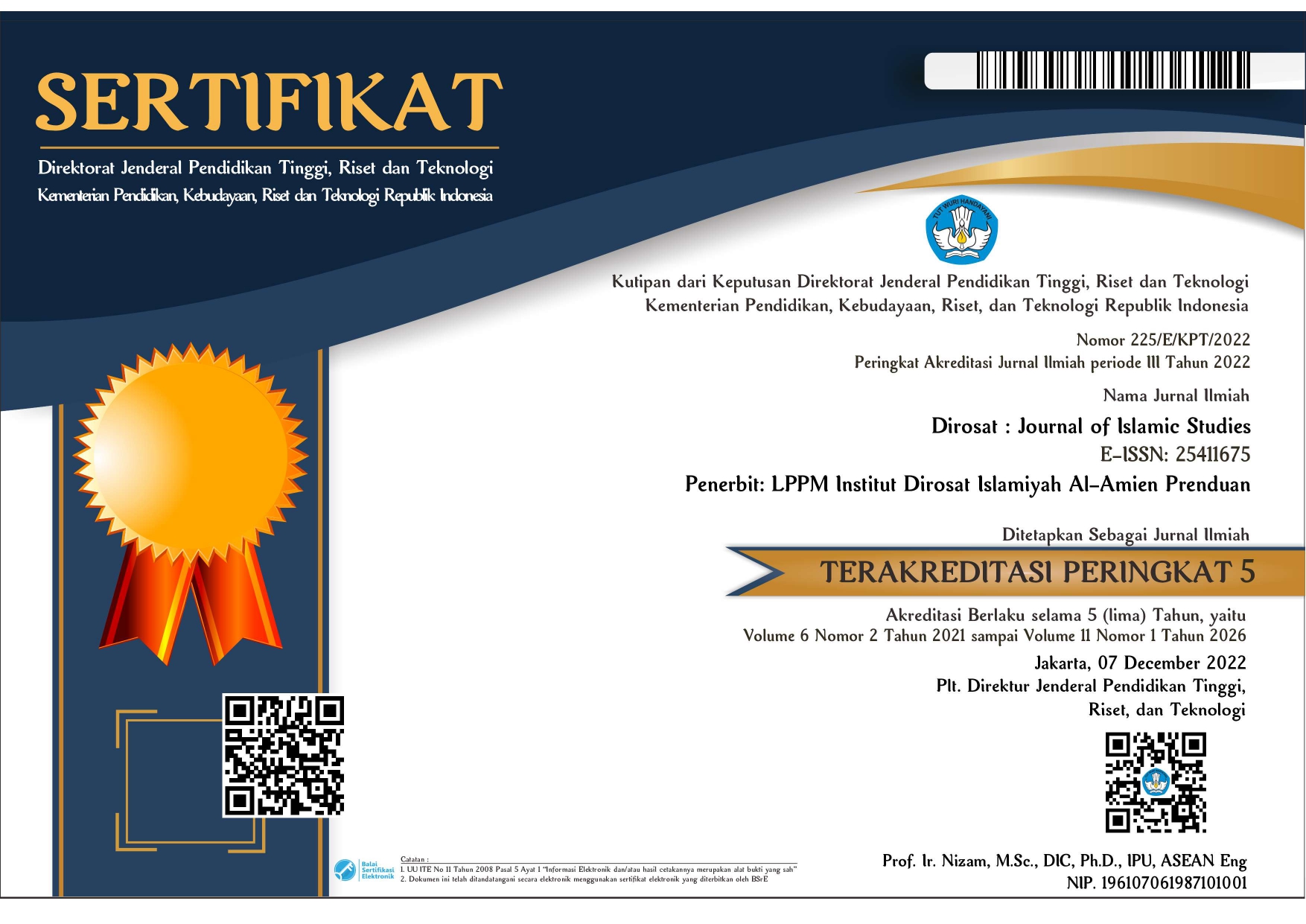ISLAMISASI TEORI KEBUTUHAN ABRAHAM MASLOW
Abstract
Abstract:
Abraham Maslow developed a theory of the hierarchy of human needs which includes five levels, starting from physiological needs to self-actualization needs. This research examines the Islamization of Abraham Maslow's theory of needs with a focus on integrating Islamic values into the concept of human needs. However, this theory has been criticized because it is considered too materialistic and does not pay enough attention to the spiritual dimension of humans, in accordance with Islamic teachings. This research uses a conceptual approach to combine the concept of Maqashid Syariah in Islam with Maslow's hierarchy of needs. In this research, Maqashid Syariah is used as a framework for integrating Islamic values in the hierarchy of human needs. The result of this research is a reconstruction of the hierarchy of human needs which places human beings, namely humans who achieve perfection in various aspects in accordance with the guidance of the Islamic religion, as the highest need. Thus, the orientation of humans' final goals changes to become oriented towards the welfare of this world and the hereafter, with Allah as the center of all these efforts. Thus, this research contributes to a more comprehensive understanding of human needs in the Islamic context.
Keywords
References
’Athiyyah, Jamaluddin. 2001. Nahwu Taf’ili Maqashid Al-Syariah. pertama. Damaskus: Dar al-Fikr.
Abdurrahman, Zulkarnain. 2020. “Teori Maqasid Al-Syatibi Dan Kaitannya Dengan Kebutuhan Dasar Manusia Menurut Abraham Maslow.” Jurnal Ushuluddin: Media Dialog Pemikiran Islam 22(1): 52–70.
Al-Attas, Syed Muhammad Naquib. 1993. Islam And Secularism.Pdf. 2nd ed. Kuala Lumpur: (ABIM), ISTAC.
Al-Syathibi, Abu Ishaq. Al-Muwafaqat Fi Ushul Al-Syari’at. Beirut: Dar Al-Ma’arif.
Auda, Jasser. 2008. Maqasid Al-Shari’ah as Philosophyof Islamic Law a System Approach. Herndon: IIIT.
Dahlan, Abdul Azis. 1996. Ensiklopedi Hukum Islam. Jakarta.
Faliyandra, Faisal, Stai Nurul, and Huda Kapongan. 2019. “Konsep Kecerdasan Sosial Goleman Dalam Perspektif Islam (Sebuah Kajian Analisis Psikologi Islam).” Jurnal Inteligensia 7(2): 2–4.
Iffah, Fadhillah, and Yuni Fitri Yasni. 2022. “Manusia Sebagai Makhluk Sosial.” Lathaif: Literasi Tafsir, Hadis Dan Filologi 1(1): 38–47.
Jamaluddin `At?iyyah. 2003. Na?wa Taf`il Maqasid Asy- Syari`a. Damaskus: Dar al-Fikr.
Kremer, William, and Claudia Hammond. 2016. “Abraham Maslow and the Pyramid That Beguiled Business.” BBC Magazine (September 2013): 1–19. https://247caregivingproducts.com/lifenow/Maslow_HierarchyOfNeeds_Pyramid_BBC.pdf.
Mahmud, Akilah. 2014. “Insan Kamil Perspektif Ibnu Arabi.” Sulesana 9(2): 33–45.
Maslow, A.H. 1954. Motivation and Personality. New York: Harper and Brothers Publisers.
Muazaroh, Siti, and Subaidi Subaidi. 2019. “Kebutuhan Manusia Dalam Pemikiran Abraham Maslow (Tinjauan Maqasid Syariah).” Al-Mazaahib: Jurnal Perbandingan Hukum 7(1): 17.
Mustafa, Hasan. 2011. “Perilaku Manusia Dalam Perspektif Psikologi Sosial.” Jurnal Administrasi Bisnis 7(2): 143–56.
Safi, L. 1993. “Towards a Unified Approach to the Shari’ah and Social Inference.” American Journal of Islamic Social Sciences 10(4): 464.
Siddiqi, N. 2011. “Islamization of Knowledge; Reflections on Priorities.” American Journal of Islamic Social Sciences 28(3).
Slamet Santoso. 2010. Teori-Teori Psikologi Sosial. ed. Sinaga. Bandung: Refika Aditama.
Tenri Awaru, A Octamaya, Rudi Salam, Supriadi Torro, and Firdaus W Suhaeb. 2021. “The Islamization of the Social Sciences: A Review.” GNOSI: An Interdisciplinary Journal of Human Theory and Praxis 4(3): 24–41.
Yuliana, Asnah. 2019. “Teori Abraham Maslow Dalam Pengambilan Kebijakan Di Perpustakaan.” LIBRARIA: Jurnal Perpustakaan 6(2): 349.
DOI: 10.28944/dirosat.v9i1.1583
Refbacks
- There are currently no refbacks.

This work is licensed under a Creative Commons Attribution-NonCommercial-ShareAlike 4.0 International License.








